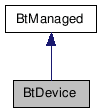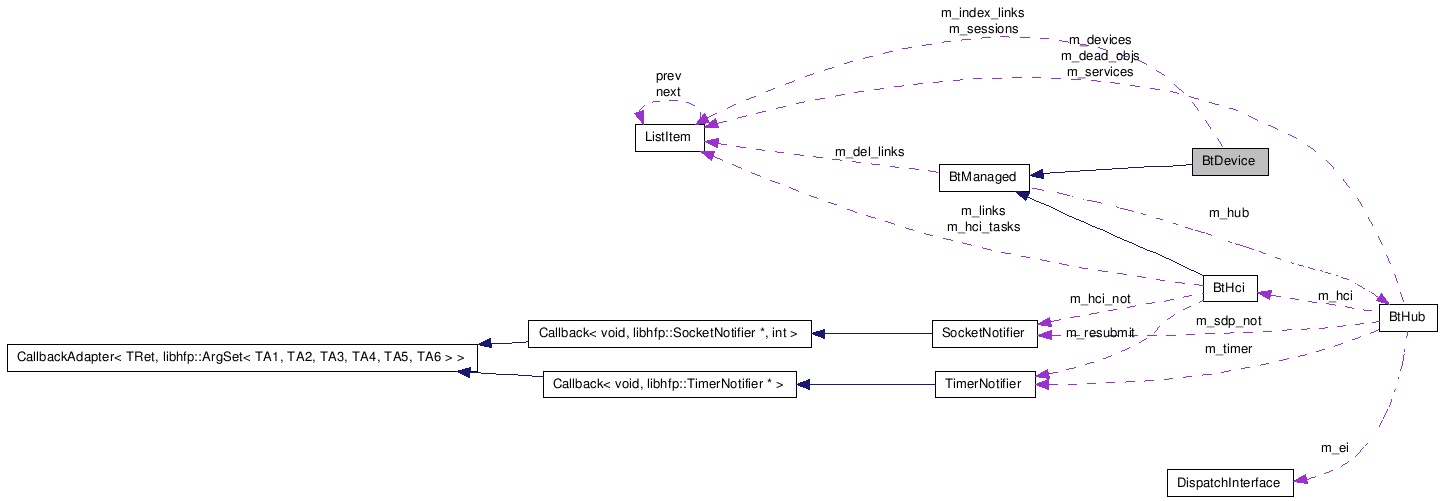
#include <bt.h>


Public Member Functions | |
| BtDevice (BtHub *hubp, bdaddr_t const &bdaddr) | |
| Standard constructor. | |
| virtual | ~BtDevice () |
| Standard destructor. | |
| void | DisconnectAll (void) |
| Disconnect all active sessions. | |
| const char * | GetName (void) const |
| Query the Bluetooth name of the device. | |
| bdaddr_t const & | GetAddr (void) const |
| Query the Bluetooth address of the device. | |
| void | GetAddr (char(&namebuf)[32]) const |
| Query the Bluetooth address of the device in string form. | |
| bool | IsNameResolving (void) const |
| Query whether name resolution is pending. | |
| bool | IsNameResolved (void) const |
| Query whether the Bluetooth name of the device has been resolved. | |
| bool | ResolveName (ErrorInfo *error=0) |
| Request that the Bluetooth name of the device be resolved. | |
| BtHub * | GetHub (void) const |
| DispatchInterface * | GetDi (void) const |
| void * | GetPrivate (void) const |
| Query the private pointer associated with the object. | |
| void | SetPrivate (void *priv) |
| Assign the private pointer associated with the object. | |
| void | Get (void) |
| Increment the reference count. | |
| void | Put (void) |
| Decrement the reference count. | |
Public Attributes | |
| Callback< void, BtDevice *, const char *, ErrorInfo * > | cb_NotifyNameResolved |
| Notification that a query of the Bluetooth name of the device has completed. | |
| Callback< void, BtManaged * > | cb_NotifyDestroy |
| Object destruction notification callback. | |
This class represents a remote Bluetooth device that can connect to local services or be connected to by local service handlers. It supports numerous use cases:
All BtDevice objects are instantiated by GetDevice() with create=true. Service handlers such as HfpService will perform the instantiation themselves in the case of devices remotely initating connections.
BtDevice objects are reference-counted, and are always destroyed when their reference count drops to zero. Destruction is not immediate and is executed in the context of a timer event.
Service frontends such as HfpSession will retain references on their underlying BtDevice objects, and the BtDevice will not be destroyed until the service frontend is destroyed and its reference is removed.
Clients may override the instantiation path for BtDevice objects by registering their own factory method to BtHub::cb_BtDeviceFactory. As part of a specialized factory, clients may use the default factory method, BtHub::DefaultDevFactory(). A specialized factory may be used to:
Standard constructor.
This method will only be useful to clients that define subclasses of BtDevice and provide a callback for BtHub::cb_BtDeviceFactory.
| [in] | hubp | BtHub with which the object will be associated |
| [in] | bdaddr | Bluetooth address of the device, also provided by BtHub::cb_BtDeviceFactory. |
| void DisconnectAll | ( | void | ) | [inline] |
Disconnect all active sessions.
Causes all sessions associated with this device to be disconnected if they are in a connected state. No client callbacks will be issued for any sessions.
| const char* GetName | ( | void | ) | const [inline] |
Query the Bluetooth name of the device.
If the device's Bluetooth name has been resolved, it will be returned, otherwise a string representation of the device's bdaddr will be returned. Name resolution may be requested by ResolveName().
| bdaddr_t const& GetAddr | ( | void | ) | const [inline] |
Query the Bluetooth address of the device.
| void GetAddr | ( | char & | namebuf[32] | ) | const |
Query the Bluetooth address of the device in string form.
This overload of GetAddr() is useful for configuration file writing paths that need to record a textual Bluetooth address.
| [out] | namebuf | A buffer to be filled with a string representation of the device's bdaddr. |
| bool IsNameResolved | ( | void | ) | const [inline] |
| bool ResolveName | ( | ErrorInfo * | error = 0 |
) |
Request that the Bluetooth name of the device be resolved.
| [out] | error | Error information structure. If this method fails and returns false, and error is not 0, error will be filled out with information on the cause of the failure. |
| true | Name resolution has been initiated | |
| false | Name resolution not initiated. Reasons might include:
|
| DispatchInterface* GetDi | ( | void | ) | const [inline, inherited] |
Query the dispatcher interface of the presiding BtHub
| void* GetPrivate | ( | void | ) | const [inline, inherited] |
Query the private pointer associated with the object.
All BtManaged derived objects have a single pointer field reserved for the use of clients. It is always initialized to zero when the object is constructed, and clients may assign it as they wish.
| void SetPrivate | ( | void * | priv | ) | [inline, inherited] |
Assign the private pointer associated with the object.
All BtManaged derived objects have a single pointer field reserved for the use of clients. It is always initialized to zero when the object is constructed, and clients may assign it as they wish.
| priv | New value to assign to the private pointer |
| void Get | ( | void | ) | [inline, inherited] |
Increment the reference count.
As per managed objects, BtManaged derived objects are not deleted so long as they have a positive reference count.
| void Put | ( | void | ) | [inherited] |
Decrement the reference count.
As per managed objects, when the object's reference count reaches zero, the object will be destroyed in the context of a timer event.
| Callback<void, BtDevice *, const char *, ErrorInfo*> cb_NotifyNameResolved |
Notification that a query of the Bluetooth name of the device has completed.
Name resolution is normally initiated by ResolveName().
This is particularly useful for device scanning, where a BtDevice is created for each inquiry result, but no Bluetooth names are initially available. As Bluetooth names are resolved, this callback can be used to update user interface widgets.
| char* | Bluetooth name of the device, or NULL if name resolution failed. This value is also available by calling GetName(). | |
| ErrorInfo* | error Error information structure describing the reason for the asynchronous name resolution failure, or 0 if the resolution succeeded. |
Callback<void, BtManaged*> cb_NotifyDestroy [inherited] |
Object destruction notification callback.
This callback is invoked proir to deletion of the managed object, so that clients may release associated resources. This callback occurs in the context of a timer event, and complies with the rule of not invoking client callbacks in a nested fashion.
The decision to destroy the object is final. The client may not attempt to preserve the object by acquiring additional references from this callback.
 1.5.4
1.5.4